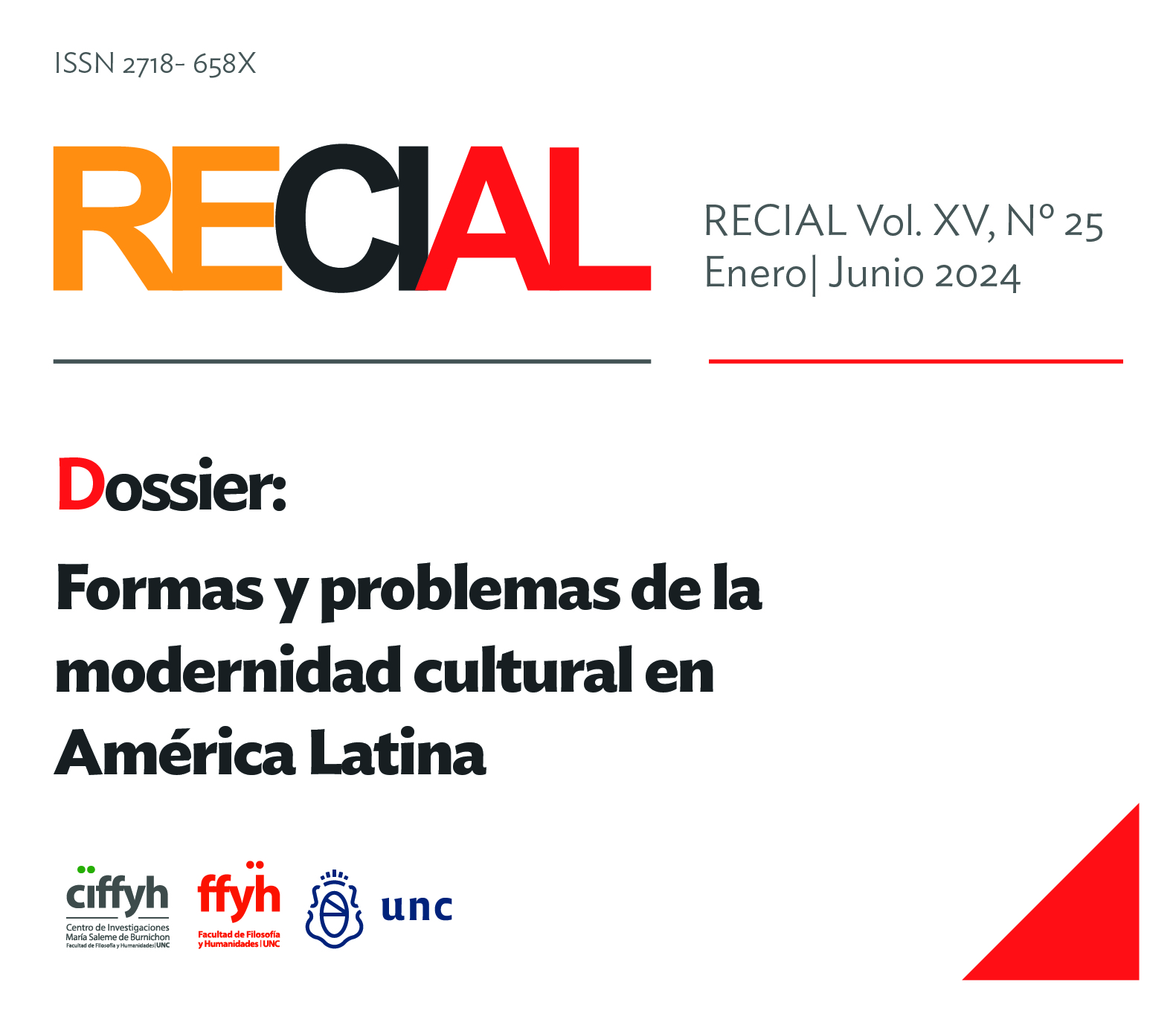Intermediality and Immersion: A Reading of Robertita
DOI:
https://doi.org/10.53971/2718.658x.v15.n25.45632Keywords:
intermediality, immersion, Robertita, roommates, remediationAbstract
The objective of the following work is to elaborate a reading of Robertita's Roommates based on the concepts of intermediality and immersion. This operation will allow us to question, for the present, the centrality of the medial specification hypothesis typical of formalism. In the first place, we will examine the intermedial references to analyze the operations in which the novel performs a figuration of the subjective effect of the new information technologies. Secondly, beginning with the intermedial character of the work (text, image, music), we will argue that this mixture in the structure of the work seeks to produce a remediation of the language of cinema, introducing a particular immersion, of a temporary and emotional nature. Finally, a call is made to elaborate new theoretical-critical vocabularies to respond to the singularity of these artistic events. We propose the figure of the intermedial critic to refer to that critic who, without losing his philological or discourse analysis training, delves into new languages and knowledges.
References
Bajtin, M. (1982). Estética de la creación verbal. México: Siglo XXI.
Bajtin, M. (1990). Art and Answerability. Austin: University of Texas Press.
Bardet, M. (2019). Límite y relación: pensar el contacto desde la filosofía de Gilbert Simondon. Revista de filosofía, (76), 39-56.
Brizuela, N. (2014). Depois da fotografía. Uma literatura fora de si. Rio de Janeiro: Rocco.
Garbatzky, I. (2016). El presente como excursión. Expansiones de la literatura en el arte. Estudios curatoriales, 4.
Garbatzky, I. (2023). ¡No me hagas una esquizofrenia acá! Cuerpos expuestos / cuerpos disciplinados desde el confinamiento. Heterotopías, (12), 1-11.
Garramuño, F. (2015). Mundos comunes. Buenos Aires: FCE.
Jenkins, H. (2008). Convergence culture. La cultura de la convergencia en los medios de comunicación. Barcelona: Paidós.
Kozak, C. (2017). Esos raros poemas nuevos. Teoría y crítica de la poesía digital latinoamericana. El jardín de los poetas, (4), 1-20.
Lovink, G. (2019). Sad by Design. On Plataform Nihilism. Londres: Pluto Press.
Maurette, P. (2015). El sentido olvidado. Ensayos sobre el tacto. Buenos Aires: Mardulce.
McDonald, T. J. (2007). Romantic Comedy. Boy Meets Girl Meets Genre. Nueva York: Columbia University Press.
Mora, V. L. (2012). El lectoespectador. Barcelona: Seix Barral.
Panesi, J. (2018). La seducción de los relatos. Crítica literaria y política en la Argentina. Buenos Aires: Eterna Cadencia.
Payás Puigarnau, A. (2008). Funciones psicológicas y tratamiento de las rumiaciones obsesivas en el duelo. Revista de la Asociación Española de Neuropsiquiatría, (102), 309-325.
Penas López, M. (2014). Individuación, individuo y relación en el pensamiento de Simondon (Tesis doctoral). Universitat Autònoma de Barcelona.
Rajewsky, I. (2005). Intermediality, Intertextuality, and Remediation: A Literary Perspective on Intermediality. Intermédialités / Intermediality, (6), 43-64.
Robertita (2020). Roommates. Buenos Aires: Beatriz Viterbo.
Romero Jodar, A. (2006). The quest for a place in culture: The verbal-iconical production and the evolution of comic-books towards graphic novels. Estudios Ingleses de la Universidad Complutense, (14), 93-110.
Ryan, M.-L. (2001). Narrative as Virtual Reality. Immersion and Interactivity in Literature and Electronic Media. Baltimore: The Johns Hopkins University Press.
Todorov, T. (Comp.). (2012). Teoría de los formalistas rusos. Madrid: Siglo XXI.
Topuzian, M. (2013). El fin de la literatura. Un ejercicio de teoría literaria comparada. Castilla. Estudios de literatura, (4), 298-349.
Volek, E. (Ed.). (1992). Antología del formalismo ruso y el grupo de Bajtín. Polémica, historia y teoría literaria. Madrid: Fundamentos.
Wolf, W. (2013a). Aesthetic Ilussion. En W. Wolf, W. Bernhart y A. Mahler (Eds.), Immersion and Distance. Aesthetic Ilussion in Literature and Other Media (pp. 1-63). Amsterdam: Rodopi.
Wolf, W. (2013b). Aesthetic Ilussion as an Effect of Lyric Poetry. En W. Wolf, W. Bernhart y A. Mahler (Eds.), Immersion and Distance. Aesthetic Ilussion in Literature and Other Media (pp. 183-233). Amsterdam: Rodopi.
Downloads
Published
Issue
Section
License

This work is licensed under a Creative Commons Attribution-NonCommercial-ShareAlike 4.0 International License.
Aquellos/as autores/as que tengan publicaciones en esta revista, aceptan los términos siguientes:
- Los/as autores/as conservarán sus derechos de autor y garantizarán a la revista el derecho de primera publicación de su obra, el cuál estará simultáneamente sujeto a la Licencia de reconocimiento de Creative Commons que permite a terceros compartir la obra siempre que se indique su autor y su primera publicación esta revista.
- Los/as autores/as podrán adoptar otros acuerdos de licencia no exclusiva de distribución de la versión de la obra publicada (p. ej.: depositarla en un archivo telemático institucional o publicarla en un volumen monográfico) siempre que se indique la publicación inicial en esta revista.
- Se permite y recomienda a los/as autores/as difundir su obra a través de Internet (p. ej.: en archivos telemáticos institucionales o en su página web), luego de su publicación en la revista. (Véase El efecto del acceso abierto).





